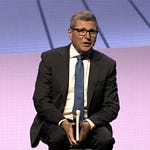At Thursday’s National Press Club energy debate, I asked Energy Minister Chris Bowen a simple question: “Have electricity prices risen on your watch?” Once again, he refused to concede it, saying only that prices were higher than the government would like.
On that, we can all agree.
But here’s the point. In December 2021, Bowen released modelling that claimed Labor’s energy plan would reduce household electricity bills by $275 by 2025. It was a centrepiece of the last election campaign. In April 2022, I warned him in an interview that the modelling was flawed and would not survive contact with reality.
This is the interview.
When the interview ended, I urged Bowen to stop telling people their power prices would fall. Now, there’s no reason a politician should accept the advice of a journalist — but I was not alone. In private, I understand at least one senior energy executive issued the same warning.
Bowen was undaunted. He — and many others in Labor — repeated the pledge in 2022, 2023, and all through 2024. He repeated it as electricity prices spiked. He repeated it as federal and state governments began spending billions in subsidies to protect consumers from massive hikes in their power bills.
Then, this year, the rhetoric began to shift. In an interview on Sky, Bowen claimed electricity prices were falling. It’s axiomatic: if prices are falling, the government wouldn’t need to subsidise them. Then it emerged that this breathtakingly cynical claim rested entirely on the morphine of energy subsidies suppressing the real pain of actual price hikes. The Commonwealth’s share of those subsidies now stands at $6.8 billion.
The spin cycle drew in other ministers. On Budget night, this line appeared in the Treasurer’s speech: “Electricity prices went down 25 per cent here last year...”
Yet the Treasurer’s own Budget papers confirm this: “Without Commonwealth and state government electricity rebates, electricity bills would have been around 45 per cent higher in the December quarter 2024.”
Using Labor’s preferred measure — citing numbers not adjusted for inflation — electricity prices on the east coast have risen by 43 per cent for residential bills and 53 per cent for businesses since Labor came to power.
Consumers are now expected to be grateful for having their taxes recycled as “cost of living relief.” The arsonist demands thanks for waving a garden hose over his own inferno.
On Thursday I asked Bowen to confirm one fact: “Electricity prices are rising, aren’t they, Minister? That’s written into every power bill, isn’t it? And if you can’t admit that simple fact, why should anyone believe anything you say?”
It was a question aimed at piercing a thick fog of spin — and he dodged it.
Bowen’s first move was to claim he wasn’t sure what the question was. Then he accused me of editorialising — of having “strong views” and saying things on Sky News with which he disagrees. That’s true. I do. But facts are not feelings. And the truth is, energy prices have risen — not fallen — since Labor made its promise. That’s not my opinion. That’s a fact.
Eventually, Bowen conceded that prices are “higher than we’d like,” before pivoting to global woes: the war in Ukraine, international volatility, and other factors beyond his control.
The problem is, the things within Bowen’s control are the ones that will drive prices ever higher. Wind and solar cannot deliver 24/7 power. They will never set the price of electricity at times of peak demand. And the explosion in transmission and distribution costs has yet to hit household bills. The future, on Bowen’s preferred path, is ruinously expensive.
Thursday’s exchange was instructive. It wasn’t just about power prices. It was about trust. And one day, Bowen may learn that trust is the most important commodity in politics — and in life.
Later, I turned to the Opposition’s Ted O’Brien and pressed him on gas: how he plans to lower prices by moving excess gas in Queensland south when the pipelines are already full. His answer rested on infrastructure investment and a gas reservation policy. He admitted it won’t solve short-term supply problems, but argued that storage and prioritising domestic use could help over the next few years. Maybe — but power prices are unlikely to tumble on the basis of what we’ve seen from the Opposition so far.
Both sides are constrained by reality. Neither can promise to cut electricity bills. But only one side promised a miracle — and is now pretending they delivered it.
The video courtesy of Sky News Australia.














Share this post